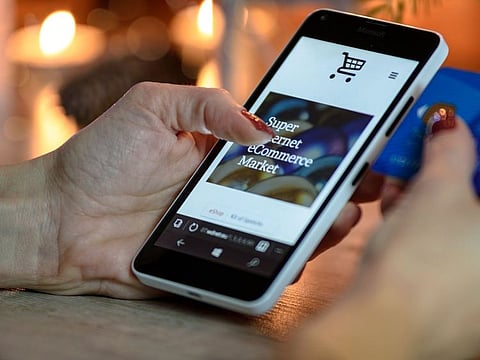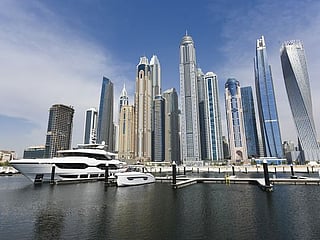Grocery is what's ruling UAE online shopping sales in 2020
In 2019, grocery was about $300 million out of $3.5 billion

Dubai: The hundreds of dirhams spent on each online grocery purchase in the UAE is adding up to a huge total – and powering the overall e-shopping space. Estimates suggest online shopping in the UAE and Saudi Arabia will add a staggering $7.5 billion over the 2019 total to close this year at $12 billion.
Grocery sales in the UAE should cross $1 billion this year based on current buying trends, and that would make up 20 per cent of the country’s total online retail sales of $5 billion. (In 2019, grocery was about $300 million out of $3.5 billion.)
Today, much of online retail is being powered by fruits and vegetables, and all those products needed to get on with daily needs. And powering the transition to online shopping of grocery and consumer goods is the pandemic.
Or, to be more precise, shoppers’ decisions to choose a safer option to bring down the risk of infection. “E-grocery was the biggest beneficiary during the lockdown weeks and grew by more than three times,” said Sandeep Ganediwalla, Regional Partner at RedSeer Consulting.
It gets even better – after the restrictions on movements eased, it was assumed that online grocery sales would decline immediately, and that shoppers would go back to picking their fruits and veggies at hypermarkets. That’s not how it is turning out to be.
“We were expecting only 50 per cent of that e-grocery demand in UAE to sustain after the lockdown,” said Ganediwalla. “However, we are witnessing that the “stickiness” among e-grocery customers is higher than expected - with almost 70 per cent of the peak e-grocery demand remaining during the third quarter of 2020.
“The key driver for this high is the extended COVID-19 impact, improved delivery times by online grocery portals, and increased supply as new players entered the market.”
Who would have thought it?
As recently as February, online grocery sales in the UAE was seen as having high potential, but apparel, accessories and tech gadgets were seen as the primary drivers of e-shopping demand. The pandemic’s changed all that… for good. Based on market feedback, grocery and consumer durables are making significant contributions to Amazon and noon sales. Plus, add in the orders and deliveries made by LuLu and Carrefour, and more recently, by Spinneys.
Then there are the ‘hyper-local’ platforms. Kitopi and Talabat are going strong, as is Careem Now (Uber Eats vacated the UAE market). “Spinneys and DubaiStore (supported by Dubai Economy) went online in this quarter,” said Ganediwalla. “It is heartening to see that e-grocery has also provided opportunities to many micro-entrepreneurs to start their business using simple conversational commerce tools such as WhatsApp.” (‘Stickiness’ is a key measurement in the online selling business, and in simple terms tells whether a shopper is making repeat visits to the portal after the first purchase.)
Staying on for good
Standard Chartered has just come out with a global poll of consumer spending habits, and how COVID-19 has reshaped these. Nearly 50 per cent said they “prefer” to shop online now – and that’s a 14 per cent gain since the pandemic struck. The UAE consumer responses are in line with the global.
Of all that increased spending migrating to online portals, grocery sales are higher by 41 per cent while buying clothes are down 55 per cent. And spending on experiences such as travel, outings, etc., have taken a 41 per cent hit.
Backed up by offers
Online portals are also learning in double quick time the value of special offers and promotions in moving grocery and other items. This year, and going forward, these matter more than they ever did in the past.
“We are seeing that consumers are spending only on essentials outside of promotion periods,” said Ganediwalla. “That’s because of the uncertainties related to their incomes, etc. “In response, retailers are running periodic discounts and so local consumers are trained to wait for these. For example, more than 90 per cent of consumers in the UAE and Saudi Arabia mentioned “White Friday” as an important event where they would look to buy retail products this year.”
Amazon’s ‘Prime’d
Amazon is rolling out its annual ‘Prime Day’ starting midnight on October 13 and running through October 14 as well, where its Prime members can access all of the deals the e-tailer has put up. As to the extent of discounts on offer will be announced closer to the launch date.
“In the midst of an unprecedented year, we’re committed to making this year’s Prime Day even more successful as we give members across the UAE the chance to save big on everything they need,” said Ronaldo Mouchawar, Vice-President of Amazon Middle East and North Africa.
We already saw two big acquisitions - Carrefour buying Wadi and more recently Delivery Hero buying Instashop. We could see more such acquisitions as the e-grocery market is growing

Who’s winning the grocery wars?
That’s too to early say, because online-only grocery sellers are holding their own against the brick-and-online hypermarket giants as well as the likes of noon and Amazon. This could all change as shopper preferences crystalize further.
“Omni-channel players such as Carrefour and Lulu lead in terms of top-of-mind awareness among customers,” said Ganediwalla. “’Horizontal’ players such as noon and Amazon have steadily built awareness within the grocery space also.
“Noon, after the launch of ‘noon daily’ in UAE, has a wide range of fresh categories (fruits, vegetables, meat, fresh dairy) that Amazon currently does not have, and which gives noon an edge. But we saw the largest positive change in awareness in the third quarter of 2020 in favour of hyperlocal players such as Talabat, Kitopi and Careem Now.”
Sign up for the Daily Briefing
Get the latest news and updates straight to your inbox









